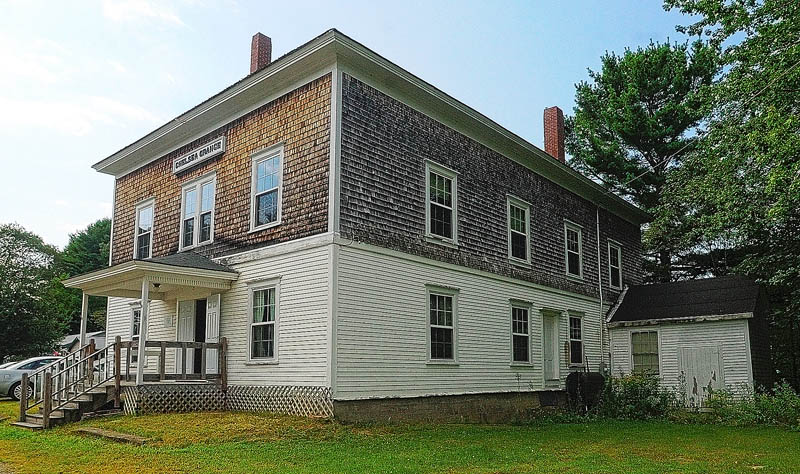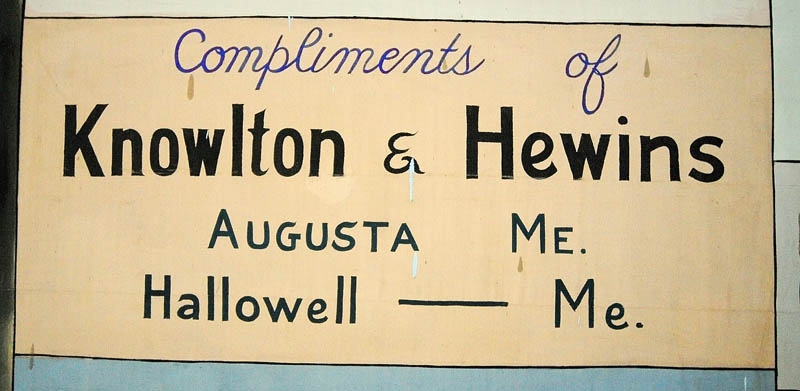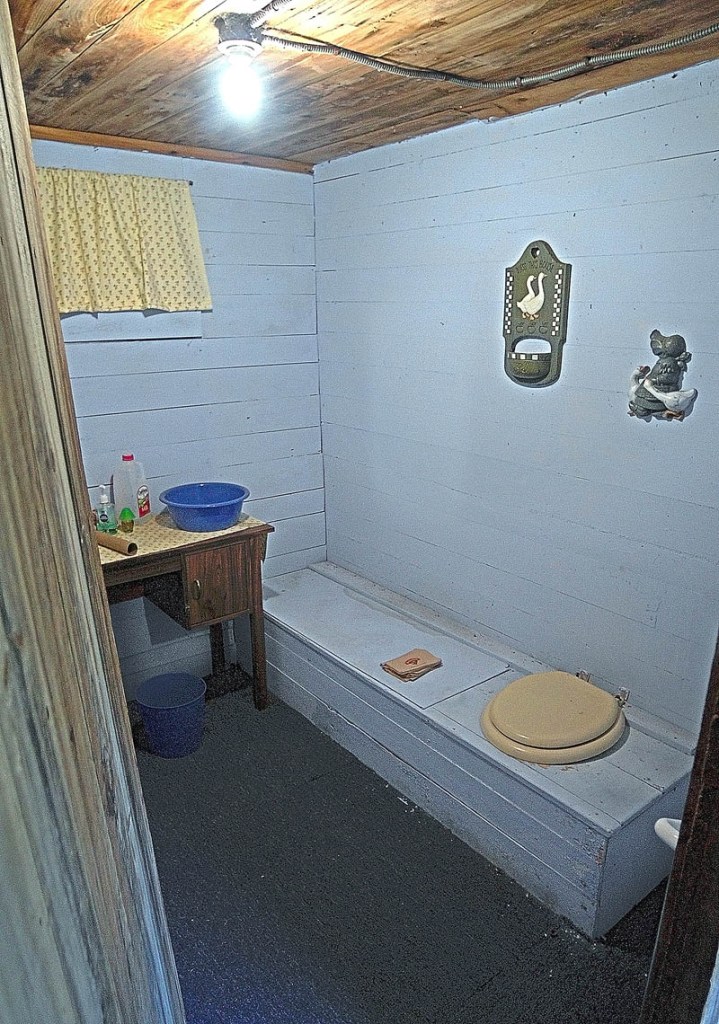CHELSEA — Esther Shaw, 88, ambled up the steep stairs to the second floor of the century-old Chelsea Grange with its expansive and empty theater hall.
A large stage curtain painted with advertisements for local companies, some still in business, hides the backstage clutter of plastic flower centerpieces, boxes of dust-covered copies of the Grange’s songbook and a wooden sign spray painted with the number of a Boy Scout troop that used to meet in the building years ago.
Shaw emphasized the quality of the wood flooring during a tour of the building on Thursday, pointing out that it’s still level and has minimal creaks and groans.
“When you look at the floor and it being a hundred years old, it’s pretty darn good,” she said.
The worn, three-inch wide floorboards are a grayish tan, faded from years of chairs shuffling, community dances, graduation ceremonies and — most recently — exercise classes and a line dancing club.
“We used to put on minstrel shows and this place would be packed,” Shaw said. “I can still remember one of the ladies always sang, ‘Won’t You Come Home Bill Bailey.’ That was always a hit of the show. Of course, those aren’t permitted anymore.”
The building, like other grange halls in the state, is in need of repairs. The approximately 20 members of the organization are trying to raise the roughly $12,000 needed to replace the leaking roof. The building also lacks running water and a bathroom — other than an indoor outhouse Shaw calls the “one-holer.”
“I hope the building won’t be abandoned, that we’d have to give up our charter and have it fall down around us,” Shaw said. “The workmanship in this building should be preserved.”
Maine Preservation, a nonprofit organization that advocates for and supports the preservation of historic buildings and places, added Grange halls to its list of the state’s most endangered historic resources in 2003.
Greg Paxton, executive director of Maine Preservation, said adding Grange halls signified their importance to communities, often rural, and the workmanship in the historical buildings, some of which are in danger of falling further in disrepair.
“Buildings that aren’t heavily used tend to deteriorate over time,” Paxton said. “When they’re used a lot, someone is paying attention and the little things get handled before they get larger.”
Membership at Granges across the country has also declined. Membership of the National Grange, which was founded in 1867 as a coalition of farmers, peaked at more than 500,000 in the 1870s and 1880s, and again between the 1920s and 1950s, according to Amanda Brozana, communications director for the National Grange. More than 40,000 Granges have been charted in the organization’s 150-year history, she said.
Now the number of local chapters hover around 2,100 with just more than 160,000 members, Brozana said.
The National Grange, also known as the Order of Patrons of Husbandry, still retains its original focus and advocates on behalf of agriculture and rural interests in Washington D.C. Recently it’s been pushing for the passage the Farm Bill, the omnibus law of agriculture and food policies in limbo in Congress. It also been advocating for rural infrastructure expansion, Brozana said.
The Maine State Grange has had a similar drop in numbers. Membership peaked with 50,000 to 60,000 members in the mid-20th century but is now down to less than 5,000 members in 135 to 140 local Granges, according to Vicki Huff, master of the Maine State Grange.
“Unfortunately, with many fraternal organizations, the numbers seem to decline,” Huff said.
“Asking people to join is our biggest hurdle. People will tell you if you ask 100 people, you might get four people to join. That’s a lot of nos before you get four yesses.”
Linda Weston, of Winthrop, is a member in Chelsea that recently said yes.
Weston’s line dancing club found the Chelsea Grange when it was looking for a new place to practice.
Weston, 61, joined the Grange and is helping the group in its fundraising effort. She helped them write and send letters to local businesses asking for donations. Before she joined, Weston said the group was planning on handwritting the letters. She’s also submitting grant applications on behalf of the group.
Shaw said the group has about $500 toward the $12,000 cost of the roof.
Even with a leaking roof and the one-holer bathroom, Weston said she enjoys going to the Grange meeting each month on the first floor of the building and learning more about the history of the organization and building.
The first-floor room was set up on Thursday for the upcoming meeting in September. Desks with gold-tasseled blue velvet tapestries hung over their fronts form a circle around the altar where a Bible is placed during ceremonies. The Grange is a non-denominational organization, but it’s filled with rituals, similar to the Freemasons.
The state master, Huff, said a lot of Granges in Maine are shifting their focus more to community service than agriculture, although farming is still an important element. The Chelsea Grange, like many others, donate dictionaries to third-graders at local schools.
“If folks knew what they Grange had to offer, they would truly come to the door, but we need to sell ourselves better and explain what the Grange is about,” Huff said.
Richard Grotton, chairman of the State of Maine Grange Board of Directors, said the membership trend seems to be going up, especially among younger people.
A new Grange in West Bath was started a few months ago by people largely under 40 years of age, Grotton said.
“I think with the economy as it is, people can’t afford new toys and going out to eat all the time, so they’re kind of regressing back to the group-style, bring a potluck and have a good meal type deal,” he said.
Shaw, who said she joined the Grange about 60 years ago, enjoys the community service aspect of the organization and the people she has met through it.
“We’ve done a lot of good things and we could do more with more people to work on them,” she said.
On the first floor of the Chelsea Grange a sign reads “Caution: Grange membership may cause personal happiness and community pride.”
“Well it’s true,” Shaw said. “You get to know your neighbors. You know, everybody has specific talents. And when you get a lot of people together you have more talents to contribute to the community.”
Paul Koenig — 621-5663
pkoenig@mainetoday.com
Send questions/comments to the editors.





Success. Please wait for the page to reload. If the page does not reload within 5 seconds, please refresh the page.
Enter your email and password to access comments.
Hi, to comment on stories you must . This profile is in addition to your subscription and website login.
Already have a commenting profile? .
Invalid username/password.
Please check your email to confirm and complete your registration.
Only subscribers are eligible to post comments. Please subscribe or login first for digital access. Here’s why.
Use the form below to reset your password. When you've submitted your account email, we will send an email with a reset code.